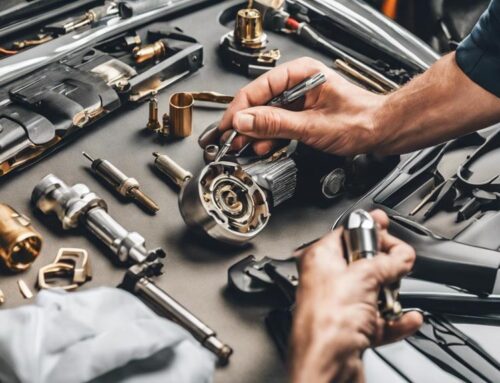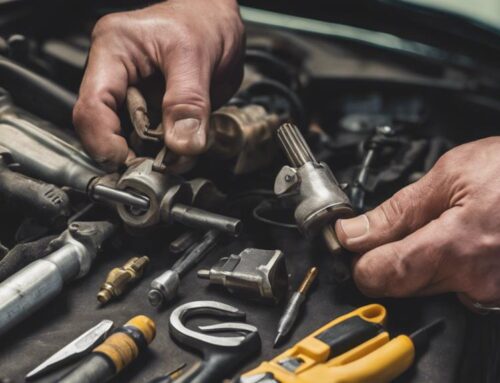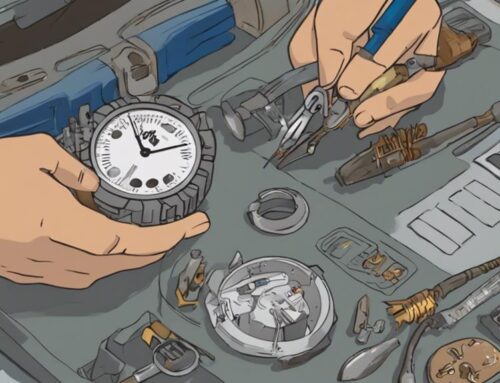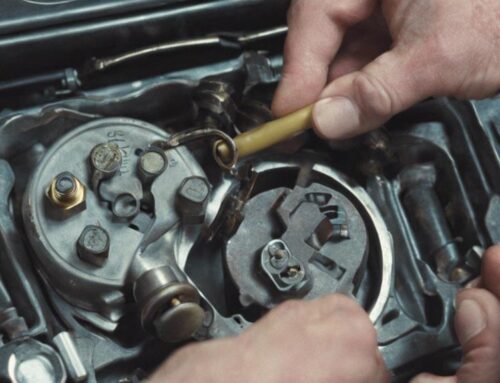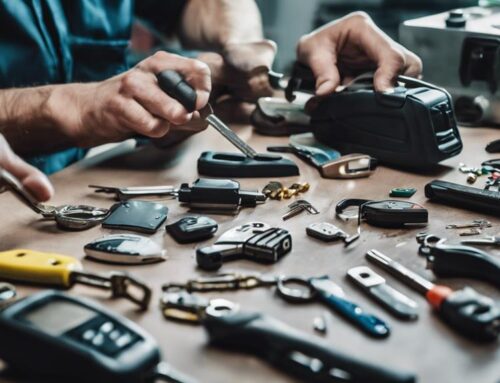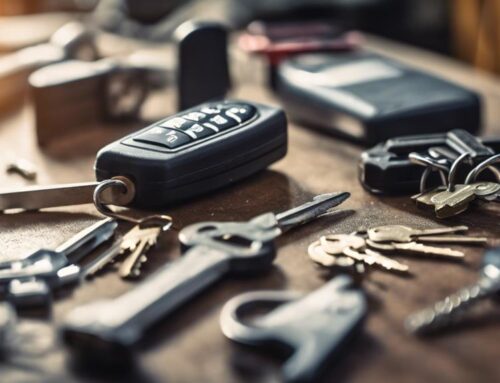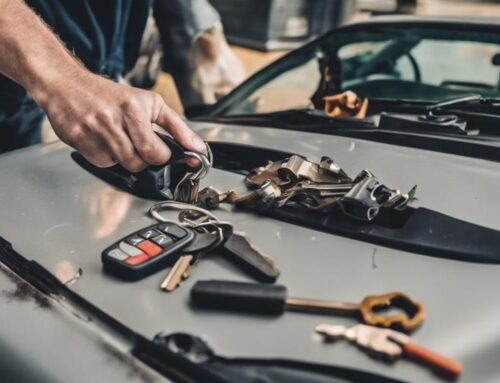Be cautious of locksmith scams that can exploit your urgency. Avoid toll-free numbers and opt for local ones to guarantee reliability. Watch for no-name companies; always verify their local address and legal business name. Be wary of unbranded vehicles, as trustworthy locksmiths use marked vans. Always check the locksmith’s ID and license, and be suspicious of low prices which often lead to hidden charges. Legitimate locksmiths provide detailed pricing upfront and avoid unnecessary drilling. Researching reputable locksmiths early can save you from trouble down the line. Learn more about identifying and preventing these scams to protect yourself.
Key Takeaways
- Be cautious of locksmiths using toll-free numbers connecting to out-of-state call centers.
- Verify the locksmith’s local address and ask for their legal business name.
- Avoid locksmiths arriving in unbranded vehicles without company logos or contact information.
- Watch out for suspiciously low prices that often lead to inflated final bills.
- Request to see the locksmith’s identification and license before any work begins.
Toll-Free Phone Numbers
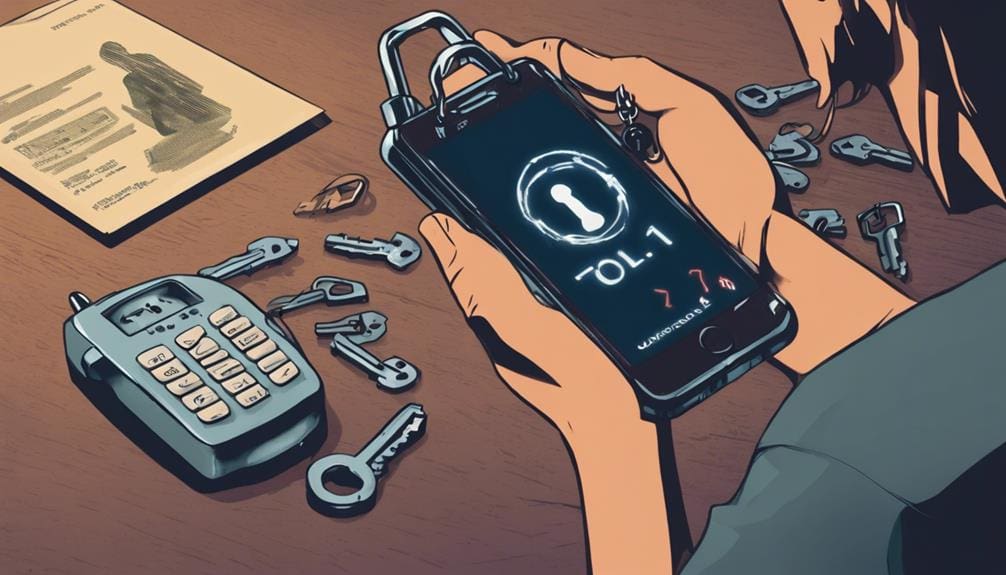
When reaching out to a locksmith, be cautious of toll-free phone numbers as they often connect you to out-of-state call centers, which can raise a red flag for potential scams. Scammers typically use these numbers and answer calls with generic greetings, lacking personalized identification. This makes it challenging to verify the legitimacy of the locksmith service. Relying on local phone numbers can help guarantee you’re dealing with a reliable locksmith. Toll-free numbers in locksmith listings can lead to untrustworthy or illegitimate services that may overcharge or provide substandard work. Always look for personalized identification when contacting a locksmith to avoid falling victim to a scam. Prioritizing local contacts assures a safer, more trustworthy service.
No-Name Locksmith Companies

Many locksmith scams start with companies that use generic names like ‘locksmith services’ instead of specific, identifiable business names. It’s essential to make sure you’re dealing with a legitimate business. Always ask for their legal business name to establish credibility.
- Verify the locksmith’s local address online to confirm it matches a legitimate location.
- Be cautious if the locksmith refuses to provide their legal business name.
- Look for distinct branding on their website and documentation.
Reputable locksmith services should have clear and specific branding. If a company uses a vague name and can’t provide details, it’s a warning sign. Protect yourself by confirming their legal business name and local address before hiring their services.
Unbranded Locksmith Vehicles

Unbranded locksmith vehicles are a significant red flag that you may be dealing with a scammer. Scammers often use these unmarked vans without company logos or contact information, which should immediately raise concerns about their legitimacy. Legitimate locksmiths, on the other hand, prioritize branding to build trust and reassure customers.
| Scammer Red Flags | Legitimate Indicators |
|---|---|
| Unbranded locksmith vehicles | Branded vehicles |
| No company logos | Visible company logos |
| No contact information | Clearly displayed phone numbers |
When you see a vehicle without proper identification, it’s wise to be cautious. Identifiable branding is a key factor in distinguishing between trustworthy services and potential scams. It is always advisable that the locksmith you hire arrives in a properly marked vehicle.
Checking Identification
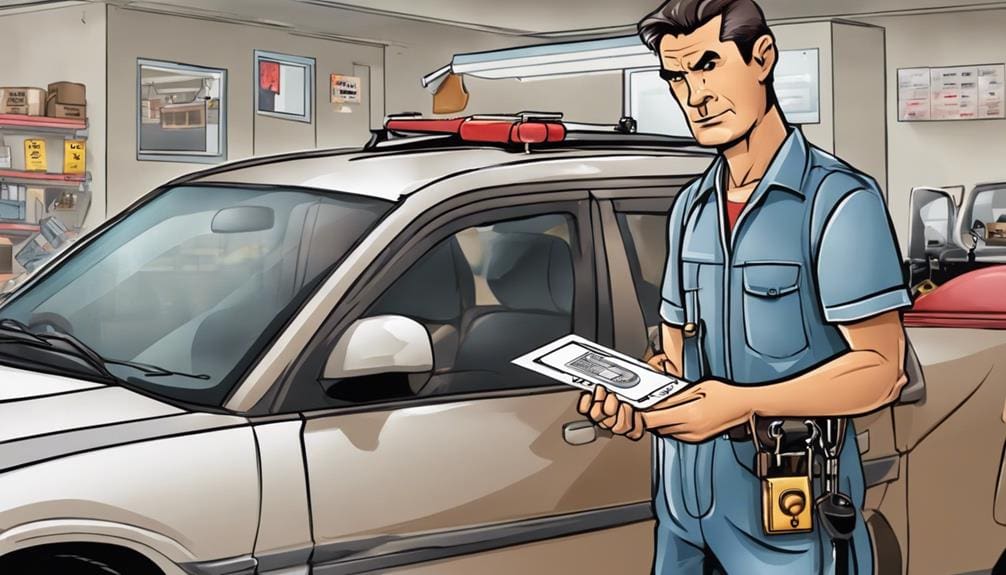
To verify you’re dealing with a legitimate locksmith, always request to see their identification before allowing them to start any work. This step is essential to avoid falling victim to locksmith scams. A genuine professional will have no issue showing you their credentials. Additionally, reliable locksmiths will request to see your identification as a security measure.
- Check for a locksmith license: Some states require locksmiths to have a license, so ask for proof if applicable.
- Verify official identification: Look for a photo ID and company branding.
- Beware of excuses: Scammers may claim they forgot their ID or don’t need one.
Suspiciously Low Prices
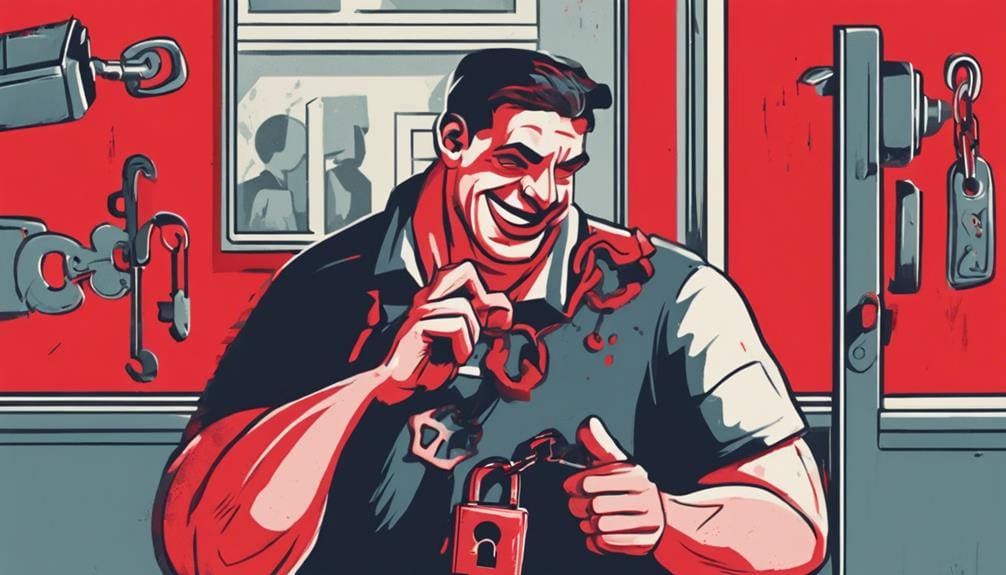
When you see locksmith services advertised at suspiciously low prices, it’s often a bait-and-switch tactic designed to lure you in. Genuine locksmiths have overhead costs that make it unrealistic to charge as little as $15 to $40 for a service call. Be wary of initial quotes that seem too good to be true, as they often come with hidden additional charges that inflate the final bill.
Bait-and-Switch Tactics
Bait-and-switch tactics, where locksmiths lure you in with suspiciously low prices only to inflate costs later, are a common scam to watch out for. These deceptive pricing strategies often start with quotes as low as $15 to $40, which seem like a great deal. However, once the locksmith arrives, they claim additional services or issues, leading to much higher fees.
To avoid falling victim to these scams, be vigilant for red flags:
- Suspiciously low initial quotes: Genuine services usually start around $60.
- Significantly increased prices on-site: Unexpected costs should raise concerns.
- Deceptive business practices: Transparency and honesty are key in trustworthy services.
Unrealistic Price Quotes
Scam locksmiths often hook unsuspecting customers with unrealistically low price quotes, typically ranging from $15 to $40. These rates are well below the industry standard, which usually starts at around $60. Such low prices are a red flag for a fake locksmith scam, often using bait-and-switch tactics. Once they arrive, they may claim additional services are needed, inflating the cost significantly. This practice can leave you paying much more than expected. To avoid falling victim, always be cautious of offers that sound too good to be true. Trustworthy locksmiths provide transparent pricing and detailed cost breakdowns upfront. By choosing a locksmith who communicates openly, you can ensure a fair and honest service.
Hidden Additional Charges
Be wary of locksmiths who quote suspiciously low prices, as they often tack on hidden charges after the job is done. These locksmith scams lure you in with low initial quotes, then inflate the price with hidden fees. It’s a common tactic to exploit those seeking affordable services. To avoid falling victim, remember:
- Verify credentials: Confirm the locksmith is licensed and reputable.
- Get a detailed estimate: Ask for a written quote that includes all potential charges.
- Research average rates: Know the industry standard to recognize unrealistic offers.
Verify Prices Upfront
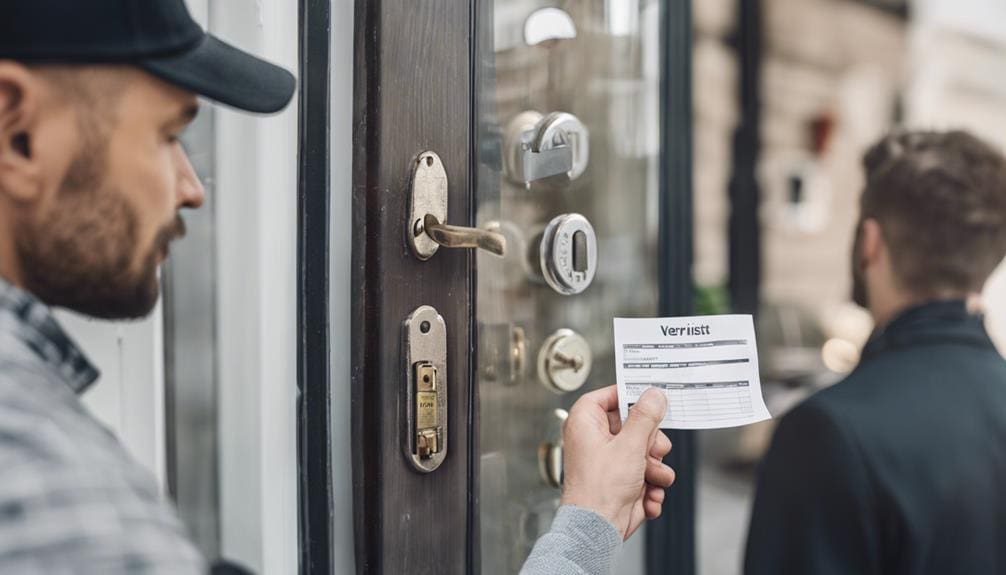
To make sure transparency and avoid unexpected charges, always request detailed pricing information from your locksmith upfront. One of the common locksmith scams involves ambiguous pricing that can skyrocket once the job is complete. You need to verify prices upfront to avoid locksmith scams and secure fair charges. Reputable locksmiths will provide a written cost breakdown and explain any price changes due to the complexity of the job. Look for signs of a locksmith who is transparent about their pricing. Ask them to clearly outline any factors that may affect the final cost. Understanding these details in advance helps you make informed decisions and avoid potential scams, securing you get the service you deserve at a fair price.
Avoid Lock Drilling
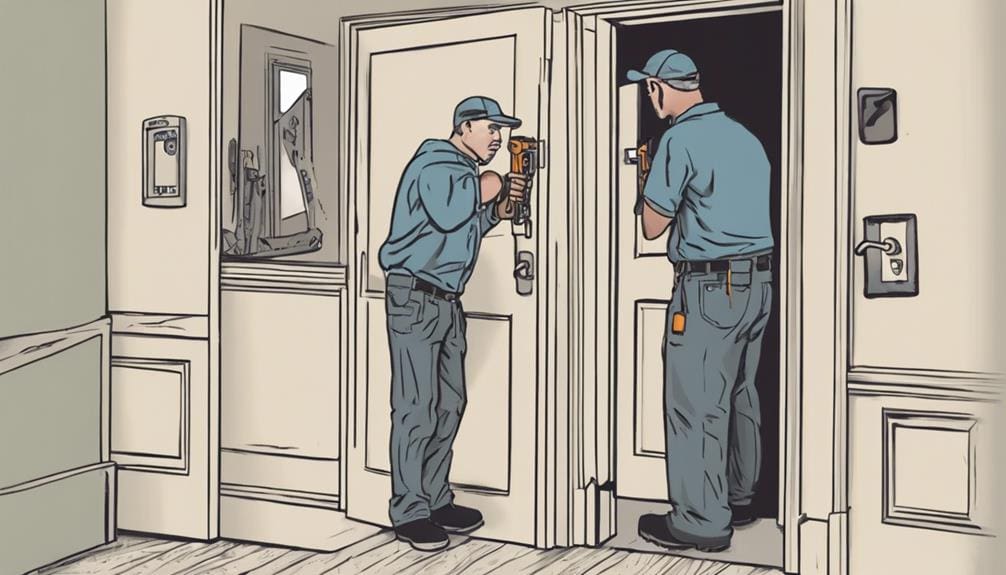
Many locksmiths can open doors without resorting to drilling or replacing locks, except when dealing with high-security systems. If a locksmith immediately suggests drilling, be cautious. Many locks can be managed with traditional lock and key methods. To avoid falling for scams, keep these points in mind:
- Question the need to drill: Always ask why drilling is necessary, especially for standard locks.
- Verify expertise: Confirm the locksmith is skilled in handling a lock without drilling.
- Consider alternatives: Rekeying or other non-invasive methods should be explored first.
Drilling should be a last option. Scammers might push for this choice to charge more or replace your lock unnecessarily. Stay informed to protect yourself and your property.
Research Locksmiths Early

Instead of waiting until you’re locked out, take proactive steps to research locksmiths early to guarantee you find a reputable professional when you need one. Begin by conducting thorough research on local locksmiths and reading reviews to assess their trustworthiness. Verify their credentials to guarantee they’re qualified and legitimate. Save the contact information of a few reputable locksmiths for emergencies. This preparation helps you avoid falling victim to scams when you’re in a vulnerable situation. Additionally, consider upgrading to keyless locks for added convenience and security, reducing the need for emergency locksmith services. Regular door lock maintenance also minimizes risks, guaranteeing you won’t need to rely on unverified locksmiths in urgent situations.
Frequently Asked Questions
How to Know if a Locksmith Is Legit?
To know if a locksmith is legit, first ask for their legal business name. Verify their address online if they’re local. Look for the company logo on their vehicle when they arrive. Always request identification and check for proper licensing. Reliable locksmiths will provide these without hesitation, ensuring you receive professional and trustworthy service. Remember, taking these steps helps protect you and others from potential scams.
How to Not Get Scammed by a Locksmith?
To avoid getting scammed by a locksmith, request a written estimate before they start. Verify their credentials by asking for identification. Be wary if they suggest unnecessary services or change prices. Trust your instincts; if you feel uneasy, find another locksmith. Avoid those who insist on cash-only payments. By following these steps, you’ll guarantee a trustworthy, professional experience and protect yourself from potential scams.
How Can I Trust a Locksmith?
To trust a locksmith, start by verifying their legal business name and address. Look for branded vehicles and request their identification and licensing upon arrival. Avoid those who push for unnecessary drilling or lock replacements. Research reputable locksmiths in advance and save their contact information for future needs. This proactive approach guarantees you’re prepared and can confidently rely on their services when needed.
How to Not Get Ripped off by a Locksmith?
To avoid getting ripped off by a locksmith, always ask for a written estimate upfront. Be wary of locksmiths offering extremely low prices, as they might inflate the cost later. Verify their credentials by asking for identification before they start working. If they suggest unnecessary services or upsell you, challenge them. Trust your instincts; if you feel uncomfortable, don’t hesitate to seek another locksmith.


